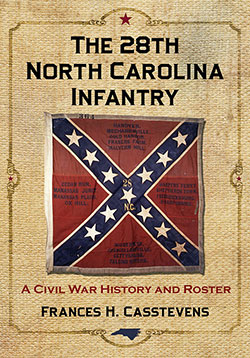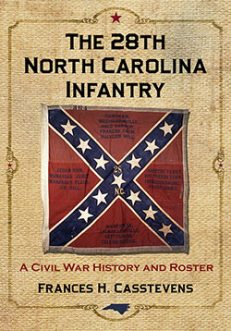The 28th North Carolina Infantry
A Civil War History and Roster
$35.00
In stock
About the Book
In April 1861, public opinion in North Carolina was divided between Union and secession supporters. It was only after President Lincoln issued his call to arms to subdue the rebel state of South Carolina that North Carolina seceded, primarily in protest of the order to fight her sister state. Beginning with a look at the prevailing atmosphere in North Carolina in the spring of 1861, this volume provides an in-depth history of one Confederate infantry regiment, the 28th North Carolina, comprised primarily of units from the central and southwestern parts of the state.
The book discusses the various battles in which the 28th North Carolina was involved—Hanover Court House, Chancellorsville, Gettysburg, Chapin’s Farm and Appomattox. Special emphasis is placed on the thoughts and surviving accounts provided by the soldiers. Appendices contain (among other data) a chronology of the 28th North Carolina; a list of casualties among officers; a list of casualties in the 28th from 1862 through 1864; and the full text of letters from two members of the 28th, the Harding brothers.
About the Author(s)
Bibliographic Details
Frances H. Casstevens
Format: softcover (7 x 10)
Pages: 315
Bibliographic Info: 45 photos, maps, glossary, appendices, notes, bibliography, index
Copyright Date: 2013 [2008]
pISBN: 978-0-7864-7713-5
eISBN: 978-1-4766-0706-1
Imprint: McFarland
Table of Contents
Acknowledgments vii
“28th Regiment, N.C.V.” xi
Introduction 1
Glossary of Military Terms 3
1. Spring 1861: North Carolina Leaves the Union 5
2. The 28th Regiment, North Carolina Volunteer Infantry Is Formed 9
3. Life in the Confederate Army 20
4. January–May 1862: Wilmington to Hanover Court House 31
5. June 25–July 1, 1862: Seven Days’ Battles 44
6. August 9–September 14, 1862: Cedar Mountain, Manassas Junction, 2nd Manassas, Ox Hill 55
7. September–December 1862: Harpers Ferry, Sharpsburg and Fredericksburg 63
8. May 1863: Chancellorsville, the South’s Greatest Victory 81
9. July 1–3, 1863: Gettysburg, a Devastating Defeat 92
10. October–December 1863: Bristoe Station to Mine Run 107
11. Spring 1864: Wilderness, Spotsylvania Court House, Jericho Mills 114
12. June–July 1864: 2nd Cold Harbor, Jerusalem Plank Road, Gravel Hill 130
13. August–October 1864: Chapin’s Farm, Fussell’s Mill, Reams’ Station, Jones’ Farm, Pegram’s Farm 140
14. Winter 1864–Spring 1865: Petersburg to Appomattox 152
15. After Appomattox 167
Appendix I: Chronology of the 28th Regiment 179
Appendix II: Engagements in Which Greenberry Harding Participated 181
Appendix III: Field and Staff and Company Officers 183
Appendix IV: Height of the Soldiers in Company F, 28th Regiment 186
Appendix V: Casualties in Lane’s Brigade, May 5, 1864–October 1, 1864 188
Appendix VI: Casualties Among Officers of the 28th Regiment, May–October 1864 189
Appendix VII: Casualties in the 28th Regiment, 1862–1864 190
Appendix VIII: Officers and Men of the 28th Regiment Who Surrendered on April 9, 1865 191
Appendix IX: The Harding Family and Letters from the Battlefield 193
Appendix X: Roster of the Troops of the 28th Regiment, North Carolina Infantry 198
Notes 279
Bibliography 297
Index 301
Book Reviews & Awards
“compelling insight…meticulous research…provides a realistic view of army life”—NC Historical Review.





